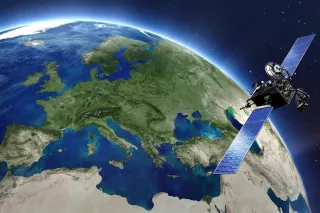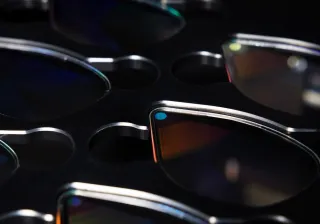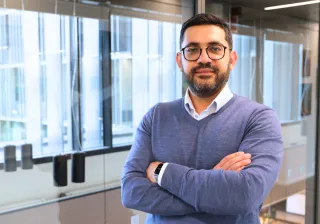VTT impacts the growth conditions of companies through its research investments, which promote the creation, innovations and commercialisation of new technologies – the key to productivity, economic growth and Finland's renewal.
In 2023, VTT launched an extensive investment project with the aim of promoting the growth of the Finnish economy through scientific breakthroughs and innovations. Significant progress has been made in the development and deployment of energy, sustainable materials and healthcare investment projects in Espoo, Tampere, Oulu and Jyväskylä. In addition, the construction of a national center of quantum and microelectronics expertise is underway, for which VTT has its own separate funding.
More than 140 companies are already involved in the investment projects, as well as a wide range of partners and research networks. Research and development work is carried out in cooperation with companies, and companies also invest in research and development projects themselves.
"Innovations play an important role in leveraging Finland's sustainable economic growth, and investing in research and development is extremely important to ensure Finland's competitiveness and growth. VTT's investments in unique research infrastructure offer industry and companies the opportunity to renew and scale innovations into industrial operations," says Laura Juvonen, Senior Vice President, Strategy at VTT.
"Cooperation with VTT provides companies with an excellent opportunity to expand their competence: 96% of the respondents to our customer impact survey say that working with VTT has increased their competence. In addition, 82% of the survey respondents quickly utilise the results of the project carried out with VTT, which means that it is possible for innovations to enter the market faster – this is also the impact we are aiming for through these investments," Juvonen continues.
Sustainable economic growth can be achieved by investing in research
It is entirely possible to achieve a productive, growing and sustainable Finland.
"In addition to public and private RDI funding and research infrastructures, the realisation of the vision requires investment in experts and, above all, in cooperation. VTT's investment projects have already created good conditions for this. For example, significant international research cooperation has been created around the development of biosynthetic materials, which will also strengthen the position of Finnish companies as pioneers in the bioeconomy. Our goal is to build significant new growth spearheads at the national level," Juvonen says.
VTT also creates impact by creating new companies and thereby commercialising the technologies developed. An example of this is VTT's spin-off company Steady Energy, which is successfully bringing to the market a nuclear energy concept for district heating and the LDR-50 small nuclear reactor developed by VTT.
Research investments have progressed as follows:
Finnish district heating reactor up and running by 2030: clean and stable heat for cities
The development of the LDR-50 nuclear energy concept developed by VTT has got off to an excellent start. The project developed an LDR-50 small nuclear reactor suitable for district heating production and low-temperature industrial applications. The spin-off company Steady Energy was founded as part of the commercialisation target in May 2023, after which the development was transferred from VTT to a separate company. VTT will continue to work as a subcontractor of Steady Energy with other companies in the nuclear energy sector.
Steady Energy's operations have grown, and cooperation agreements have been signed with Helen, Kuopion Energia and Keravan Energia. The construction of a total of 15 reactor units has been preliminarily discussed. Steady Energy and Kuopion Energia have also signed an agreement on the preliminary design of a nuclear district heating plant, which covers for example feasibility studies of plant sites and environmental impact assessments. In addition, the company has requested a preliminary safety assessment of the plant from the Radiation and Nuclear Safety Authority.
The construction of the district heating reactor could begin in 2028, and the technology would then be on the commercial market in the 2030s, as planned. Before the construction of the first reactor, the plant's safety functions will be tested at a pilot plant, the construction of which will begin at the end of the year.
The reactor concept has a very large commercial potential, which is related to the new industry developed around the created technology and could also bring significant export business to Finland.
New piloting environment for plastics and textiles: solutions to the recycling challenge of plastics and textiles
The new research and piloting environment will enable the development of recycling methods for plastic-containing composite materials and textiles that are difficult to recycle. The aim is to reduce carbon dioxide emissions, promote the circular economy and reduce dependence on imported materials.
The recycling market has significant potential: the size of the European recycled plastics market was EUR 10.5 billion in 2023 and will grow at a CAGR of 9.6% by 2030. Correspondingly, the estimated turnover of the textile recycling market to be opened is EUR 1.6 billion by 2030.
VTT cooperates with about 70 partners in projects on hard-to-recycle plastic materials, as the recycling challenge of products and textiles containing different materials is significant. In addition, the investment project also supports the circular economy theme of plastics in Borealis Polymers Oy's SPIRIT ecosystem and the development of recycling technologies in Valmet's Beyond Circularity ecosystem.
The project has already commissioned pyrolysis pilot for plastic waste and distillation pilot at VTT Bioruukki in Espoo, and a new piloting environment for the sorting and pre-treatment of plastic and textile waste will be built and commissioned in 2026 in Tampere. In addition, new research projects are being prepared in which the pilot infrastructure will be utilised to develop the recycling of multi-materials. The project’s co-funded project portfolio is approximately EUR 20 million, and VTT will invest EUR 5.5 million in new equipment
Piloting environment for sustainable fibre products: new product innovations and significant reductions in energy and water consumption in forest industry
VTT has developed a waterless web forming process, which contributes to significant savings in the forest industry's water and energy consumption. The paper industry is the third largest energy user in Europe, so the project will significantly contribute to the process industry's transition towards carbon neutrality.
The test line, which is based on the waterless web forming process of the pilot environment to be built in Jyväskylä and which will be launched at the end of the year, is at the heart of the project. The pilot line will be used to study, among other things, the production of fibre facbris and paperboard using a new process, as well as increasing the quality and production speed of the material produced. The test line will also accelerate the commercialisation of new product innovations. The new equipment will serve research and product development in the forest sector extensively and deepen Central Finland's position as a cluster of expertise in fibre-based products and the bioeconomy.
A total of about 70 forest sector companies, equipment and chemical manufacturers and SMEs have committed to the project and the entity through various projects. VTT's share of the investment is approximately EUR 5 million. A research package of approximately EUR 20 million has been built around the investment, the first results of which will be available in early 2026. The investment project has progressed according to plan, and discussions with forest sector operators regarding new research projects are to begin now.
Interest in the new technology has been great, and the project is expected to grow the business in the field many times over compared to the size of the research entity.
Biosynthetic materials development platform: new materials with natural means 10 times faster
Synthetic biology enables the replacement of fossil raw materials with renewable raw materials and the production of completely new materials with superior properties. The project will implement a development platform that utilises modelling, artificial intelligence and automation, which will significantly accelerate the design and production of biosynthetic materials.
The market for biosynthetic materials is still small, but there is significant growth potential. For example, the market for PHA bioplastics is expected to grow to more than EUR 100 million globally by 2029, and Finland can gain a significant share of the market by investing in research.
The modelling developed by VTT has already proven to be an invaluable tool in the design of new materials in the project. The project has also built a strong international research cooperation network. VTT is part of the National Science Foundation Global Centres programme's network of bioworkshops and has signed an agreement with the Lawrence Livermore National Lab in the United States. European cooperation is active, for example, in the form of several Horizon Europe projects.
The amount of projects co-financed by the project is approximately EUR 13 million, and projects worth more than EUR 10 million are being prepared. In addition, VTT will invest EUR 5.5 million in research and equipment. With the help of the funding decisions, we received at the beginning of the year, we can grow and deepen our expertise, for example, by funding theses.
Piloting environment for medical devices: prototypes that meet quality requirements and faster time to market for inventions
At the beginning of this year, VTT opened a unique piloting environment for medical devices at its Oulu office, which speeds up the market entry of inventions. The journey of health technology breakthroughs from the laboratory to patient use is slow and expensive due to strict functional and manufacturing quality requirements. VTT's globally unique piloting environment strengthens the continuity of the product development chain by offering the possibility of manufacturing prototypes in accordance with the industry's strict quality requirements.
VTT has invested EUR 3.4 million in the state-of-the-art cleanroom and manufacturing equipment of the pilot line. In the pilot environment, small and medium-sized test series can be manufactured using modern assembly techniques in electronics, photonics and microtechnologies. This enables, for example, wearable and continuously measuring devices for monitoring cardiovascular diseases or microfluidic chemical sensors for cancer diagnostics.
VTT's partners include other research organisations and, in particular, product owners of medical devices and the manufacturing industry. VTT is a key pilot manufacturer in the EU, an example of which is the coordination of the PhotonMed pilot manufacturing project under the EU Chips Act. PhotonMed involves 39 organizations, and the project has a volume of EUR 32 million, including product development stakeholders.
Kvanttinova piloting environment: Finland to become the leading RDI cluster of microelectronics and quantum technology
A joint innovation hub for companies and research operators, Kvanttinova, will be built in Espoo. Kvanttinova is a joint initiative of VTT, Aalto University, the City of Espoo, the Technology Industries of Finland's semiconductor industry group and other companies, to build a new joint RDI cluster and cleanroom environment for microelectronics and quantum technology for companies and research actors. It will be seamlessly connected to the Micronova cleanroom in Otaniemi.
The project aims to improve the competitiveness and self-sufficiency of both domestic and pan-European countries, deepen expertise and grow companies. The project also contributes to the objectives of the EU Chips Act, which aims to increase the self-sufficiency rate of European chip production to 20%.
The Lab-to-fab environment focuses on pre-commercial development and provides piloting lines for expanding research and development projects. The equipment procurement process for the pilot lines has begun, and the construction project of Kvanttinova is in the planning phase.
The investment in the pilot line is approximately EUR 105 million, the public funding of which will be divided into national separate funding and the share from the EU's Chips Act. The amount of private investments is estimated to be approximately EUR 500 million. The pilot line supports the Finnish semiconductor industry's goal of increasing net sales from the current EUR 1.6 billion to EUR 5–6 billion by 2035.
Read more:
We want to engage in a forward-looking discussion on the opportunities for sustainable growth and ensure that VTT does its part to create innovations that have an impact and renew business. In June 2024, VTT published a vision paper called Fully Possible Finland, according to which it is possible to achieve a productive, growing and sustainable Finland.





